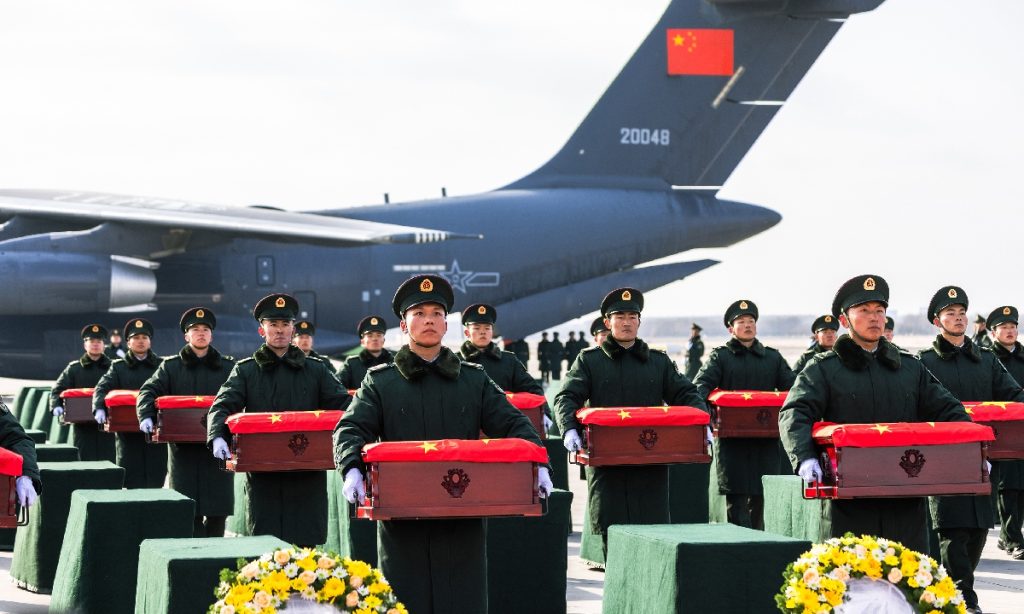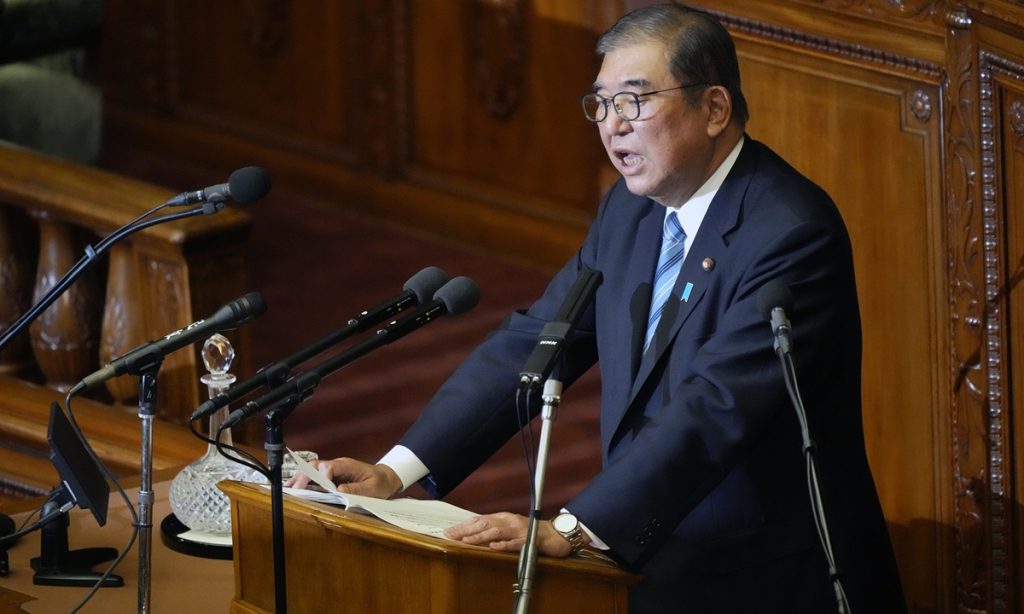Nation pays highest respect to remember the fallen heroes as 11th batch of CPV martyrs’ remains return home

The 11th batch of remains of Chinese People's Volunteers (CPV) martyrs who died during the War to Resist US Aggression and Aid Korea returned to China on Thursday, as China paid the highest respect to these heroes upon their return.
Escorted by two J-20 fighter jets, a Y-20 PLA Air Force aircraft, also known as Kunpeng, carrying the remains of the 43 CPV martyrs, landed at Shenyang Taoxian International Airport on Thursday.
Since 2014, Shenyang has welcomed the return of remains of CPV martyrs for 11 consecutive years. The latest batch brought the total number of returned CPV martyrs' remains to 981, the Xinhua News Agency reported.
Highest honors of the nation
As the remains flew back home aboard the Y-20 transport aircraft, two J-20 fighter jets escorted the flight, creating a three-plane formation which is the PLA Air Force's unique gesture of paying homage.
In a video released by Xinhua, a J-20 pilot said to the Y-20, "Welcome home, martyrs of the CPV! In this prosperous era, as you wished, we stand guard over this beautiful land and salute the fallen heroes." In response, the Y-20 captain said, "We thank the J-20 formation for escorting us, allowing us to carry the dreams of our predecessors toward new victories!"
This particular Y-20 aircraft, with the number 20048, is the one that was on display at the Airshow China 2024 in Zhuhai, South China's Guangdong Province, earlier this month.
"The Y-20 aircraft that participated in the airshow returned with great honor. It then went to South Korea to bring back the remains of the CPV martyrs, which itself is a highly respectful gesture," Song Zhongping, a Chinese military expert, told the Global Times.
On the other hand, as China's J-20 fighter jets have now entered mass production, these advanced weapons escorting the heroes highlighted the significant advancements in the PLA's military capabilities, Song said. "This offers great reassurance for the martyrs. Seeing their motherland becoming strong is what they cared about most, and is the greatest comfort to them," Song said.
Shortly after landing, the aircraft was greeted with a water cannon salute, the highest honor in aviation industry. The water arch, formed as the plane carrying the martyrs' remains passed through, symbolized profound respect for the fallen heroes and served as a gesture of welcome, honoring their return and washing away the dust of their long journey.
Following the water cannon salute, soldiers solemnly carried the caskets of the fallen heroes off the aircraft and a reception ceremony was held at the airport. After the ceremony, the caskets were transported by military trucks to the CPV martyrs' cemetery in Shenyang, Northeast China's Liaoning Province.
"Please believe that your sacrifices and devotion will never be forgotten. And please believe, that we are willing to become your eyes, to help you see the rivers and mountains of this beautiful land," Wu Qian, a spokesperson for China's Ministry of National Defense, said at a press briefing on Thursday.
Another tearful moment was "a gaze that transcends time and space" at the Shenyang People's Square. To welcome the heroes home, a national flag that once traveled to space with the Shenzhou-18 manned spacecraft was raised there. "This is the only spot where the procession carrying the martyrs' slowed down, just to allow the heroes a final, lingering gaze at this national flag," reported China Central Television.
To welcome the heroes back home, Shenyang has prepared extensively for the martyrs' return, including illuminating outdoor screens along their route to honor the martyrs. The city experienced its first snowfall of the winter on Tuesday, but the large screens on skyscrapers displaying the slogan "Mountains and Rivers Welcome Heroes Home" prominently against a red backdrop added a touch of warmth to the atmosphere.
Many residents took out their phones to take photos in front of the large screens, as they paid tribute to the heroes and eagerly awaited their return.
In addition, welcoming slogans are also displayed on buses, taxis, and at bus stops. The slogans and images, such as "Remember the martyrs, welcome the heroes home," can be seen all across the city, creating a heartwarming and unified tribute.
Shenyang has also lined the main roads with over 3,000 new national flags to honor the heroes. These meticulous arrangements highlight the city's deep respect and admiration for the martyrs.
'Momentous event'
The participation of the CPV Army in the War to Resist US Aggression and Aid Korea holds both a national and international significance. "It carried the significance of defending the homeland and supporting North Korea, as well as safeguarding world peace. It also demonstrated a great spirit of internationalism," Lü Chao, an expert on the Korean Peninsula issue at the Liaoning Academy of Social Sciences, told the Global Times.
Since an agreement to retrieve the remains of the fallen heroes was reached between China and South Korea, the event has been ongoing for a decade without any breaks. Even during difficult times, such as the THAAD issue and the global pandemic, this process has remained uninterrupted.
"This shows the South Korean government and its people's great respect to this event and the high importance they have placed on the event, which demonstrates the friendship between the two sides," Lü noted.
The event has also become a crucial part of patriotic education. Upon the martyrs' return, many local residents spontaneously waited along the roads where the fleet of the trucks carrying the remains passed through, Lü, who lives in Shenyang, told the Global Times on Thursday as he observed the touching scene.
"Large crowds flooded the streets today," Lü recalled, noting that it's "a momentous event" for the entire city. The atmosphere was solemn but filled with pride, especially considering that on Friday there will be the ceremony for placing the martyrs' remains in the cemetery, he noted. "Each year, this event is one of the most significant patriotic education activities for Shenyang. The fact that the entire city would voluntarily and consciously participate in such an activity every year is something quite precious," Lü said.
The activity has also prompted heated discussions on Chinese social media platforms. A netizen commented on China's X-like platform Sina Weibo that "whenever I see this scene [of the return of the martyrs,] I always burst into tears, because I feel they are my family."
Another netizen said that "Heroes of the people and the dearest ones of the motherland, you can finally come home … You are the pride and glory of our country and its people!"
